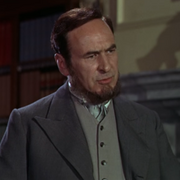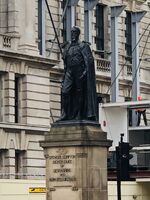
Spencer Cavendish, 8th Duke of Devonshire (23 July 1833 – 24 March 1908) was Leader of the Liberal Party from 3 February 1875 to 23 April 1880, interrupting William Ewart Gladstone's terms. He also served as Leader of the Liberal Unionist Party from 1886 to 1903 and led the Conservative Party in the House of Lords from 1902 to 1903.
Biography[]

A statue of Cavendish in London, 2020
Spencer Compton Cavendish was born in 1833, the son of William Cavendish, 7th Duke of Devonshire; he was the older brother of Lord Frederick Cavendish and Lord Edward Cavendish. He came from a powerful Liberal dynasty, and he was elected MP for North Lancashire in 1857. From 1863 to 1874, he held various cabinet posts under Lord Palmerston and Lord John Russell, and he lost his seat at the 1868 general election before regaining it a year later as MP for Radnor. In 1875, he took over the leadership of the Liberal Party from William Ewart Gladstone, but, in 1880, he was forced to step down after Gladstone announced that, following the Liberal electoral victory, he would not serve under anyone else; this forced Cavendish to turn down Queen Victoria's invitation to form a government. He served as Secretary of State for India from 1880 to 1882 and Secretary of State for War from 1882 to 1885, and the Conservative Party held him responsible for the failed attempt to relieve Charles Gordon at the besieged city of Khartoum in 1884. Cavendish became a staunch opponent of Irish Home Rule after his brother's murder by IRB dissidents, and, in 1886, he became leader of the Liberal Unionist Party, an anti-Home Rule breakaway party of the Liberals. After the 1886 election, he again declined to serve as Prime Minister, instead supporting a Conservative government; in 1887, following Lord Randolph Churchill's resignation, Cavendish declined to form a government for a third time. In 1891, he inherited his father's title, Duke of Devonshire, and, in 1893, he moved for the rejection of the Second Home Rule Bill. He served as Lord President of the Council from 1895 to 1903 and Leader of the House of Lords from 1902 to 1903, and he died of cardiac disease in Cannes, France in 1908 at the age of 74.
